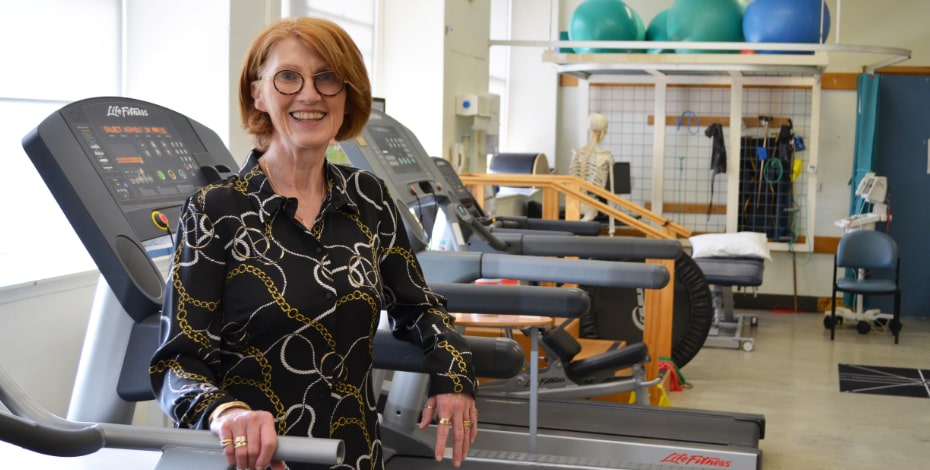
Study tour on the cards to see the world’s best

A 2019 Churchill Fellowship has been awarded to Dr Louise Fuller, APAM, enabling her to travel to four countries to explore the latest research during a four-week study tour.
For 20 years, Dr Louise Fuller has been integral to lung transplant services in Victoria. As senior clinical physiotherapist of transplant services at The Alfred, Melbourne, Louise leads a team of specialists providing respiratory physiotherapy care to heart and lung transplant patients on the wards and in the rehabilitation gym.
Under her guidance the rehabilitation program has been developed from research, and the physiotherapy team has become part of the long-term management of the transplant recipient. The Alfred’s rehabilitation program extends to patients in Victoria, Tasmania and South Australia, and is one of four programs in Australia. It is considered one of best in the world and contributes to the increases in survival and improvements in the quality of life for all transplant recipients.
Last year, 221 people received a lung transplant, with 107 at the Victorian hospital. With a 46 per cent rise in transplants in the past six years, attributed to community education about organ donation and acceptance of organs post-cardiac death, Louise says it is important that Australian physiotherapists continue to extend their knowledge in clinical care. She says being awarded the fellowship will enable her to visit four international centres of excellence in lung transplantation to investigate differing models of rehabilitation post- surgery early next year.
‘I am very humbled and excited as it’s a great opportunity to have the research side of transplants get some airplay. The fellowship motto is to “travel to investigate, return to innovate”, so it is exciting to have the opportunity to look at what are the new or innovative models of rehabilitation, not just hospital-based; observe what other people do, and extend my experience beyond The Alfred.’
Louise will spend a week collating information on the latest trends, models, outcome measures and evidence at each centre in Leuven Hospital in Belgium, Harefield in London, Duke University Hospital in the US and Toronto Hospital in Canada. Attendance at the International Society for Heart and Lung Transplantation in Montreal will wrap up her four-week study tour. She will complete a position paper on lung transplant rehabilitation in Australia on her return.
‘I’m looking to get some really good data in terms of looking at patient survival, quality of life, participation in daily life, muscle strength, mobility and getting back to work. I want to see what support they have as they are really swapping one chronic disease for another, so we also need some strategies in coping.’
With 40 years’ experience in research and clinical work, and an APA member for that time, Louise modestly refers to herself a ‘bit player who looks after the gym’ in helping patients advance through the transplantation process. However, her role in patient care begins five months before surgery, when they are listed for a transplant.
‘A lung transplant is a complicated scientific process…these people have a lifetime commitment to take immunosuppression drugs and there are side-effects on muscle and bone from those drugs, which are lifelong. Apart from the subacute rehab, patients need to be very active with lots of exercise to offset any side-effects, watch what they eat, be under surveillance of doctors—a lot of people don’t realise this,’ she says. ‘There is A-grade evidence that pre- transplant, rehabilitation programs will alter objectives.’
Thorough physiotherapy assessment includes musculoskeletal, gait and respiratory review ‘for anything that will be a barrier post-transplant’. There is a 17-day inpatient stay post-surgery, including up to three days in ICU, and then transfer to the surgical ward. ‘Then they hit the gym, which is where I come into play in rehabbing them back,’ she says.
Louise credits her team with ensuring each patient receives the best opportunity to regain a level of fitness that is aligned to their goals. ‘Each patient sets their own goals; we just help them achieve them.’ With her own goal to establish national guidelines for rehabilitation, Louise is keen to build on the physiotherapy network between Australia’s other transplant hospitals in Perth, Sydney and Brisbane.
‘Physiotherapists play a pivotal role in pulling together all areas of rehabilitation. I am very lucky at The Alfred as I am very well supported by colleagues and, in turn, we are very well supported by the extended medical teams,’ she says. ‘So, if we can get all the physiotherapists who are involved in transplant together to share their ideas through networking, this will help the next generation of physiotherapists.’
© Copyright 2024 by Australian Physiotherapy Association. All rights reserved.





